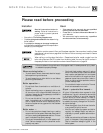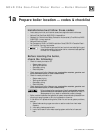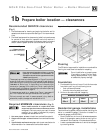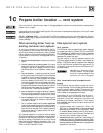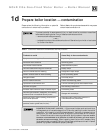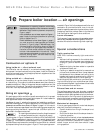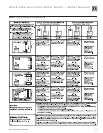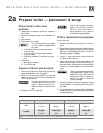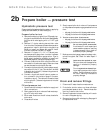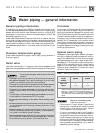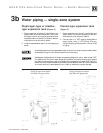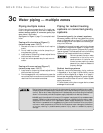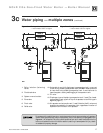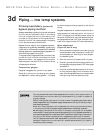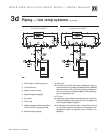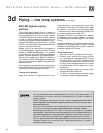
Part number 550-110-260/0508
13
GOLD CGs Gas-Fired Water Boiler — Boiler Manual
Prepare boiler — pressure test2b
Hydrostatic pressure test
Pressure test boiler before attaching water or gas piping
(except as noted below) or electrical supply.
Prepare boiler for test
1. Remove the shipping nipple (from CGs supply tap-
ping) and remove the boiler relief valve. Temporarily
plug the relief valve tapping with a ¾” NPT pipe
plug.
2. Remove 1¼” nipple, reducing tee and drain valve
from circulator hardware and pressure/temperature
gauge carton. Install in boiler return connection as
shown on page 3 and
Figure 29, page 58. Install
circulator on either the return or supply.
3. Remove 1¼” nipple, 1¼” x 1¼” x ½” tee and pres-
sure/temperature gauge from circulator hardware
and pressure/temperature gauge carton. Pipe to
boiler supply connection as shown on page 3 and
Figure 29, page 58. (Use pipe dope sparingly.)
4. Connect a hose to boiler drain valve, the other end
connected to a fresh water supply. Make sure hose
can also be used to drain boiler after test.
5. Connect a nipple and shutoff valve to system supply
connection on the 1¼” tee. This valve will be used
to bleed air during the fi ll. (Valve and nipple are not
included with boiler.)
6. Connect a nipple and shutoff valve to system re-
turn connection (at circulator fl ange if circulator
installed on return). This valve will be used to bleed
air during the fi ll. (Valve and nipple are not included
with boiler.)
Fill and pressure test
1. Open the shutoff valves you installed on supply and
return connections.
2. Slowly open boiler drain valve and fresh water sup-
ply to fi ll boiler with water.
3. When water fl ows from shutoff valves, close boiler
drain valve.
4. Close shutoff valves.
5. Slowly reopen boiler drain valve until test pressure
on the pressure/temperature gauge reaches no more
than:
•
45 psig for boilers with 30 psig relief valve.
•
75 psig for boilers with 50 psig relief valve.
6.
Test for no more than 10 minutes at:
• 45 psig for boilers with 30 psig relief valve.
• 75 psig for boilers with 50 psig relief valve.
Do not leave boiler unattended.
A cold water fi ll could expand and
cause excessive pressure, resulting
in severe personal injury, death or
substantial property damage.
7. Make sure constant gauge pressure has been main-
tained throughout test. Check for leaks. Repair if
found.
Leaks must be repaired at once.
Failure to do so can damage boiler,
resulting in substantial property
damage.
Do not use petroleum-based clean-
ing or sealing compounds in boiler
system. Severe damage to boiler
will occur, resulting in substantial
property damage.
Drain and remove fi ttings
1. Disconnect fi ll water hose from water source.
2. Drain boiler at drain valve or out hose, whichever
provides best access to drain. Remove hose after
draining if used to drain boiler.
3. Remove nipples and valves unless they will remain
for use in the system piping.
4. Remove plug from relief valve tapping. See page 14
to replace relief valve.



